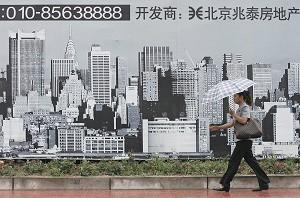From Nov 13 to Nov 24, the Chinese Central TV (CCTV) station broadcast its twelve episode series “Emerging Superpower” during prime time. The program prompted significant speculation due to its background as well as content.
Background
The 12 episode series “Emerging Superpower” provides an analysis of the rise and fall of nine countries in world history, including Portugal, Spain, the Netherlands, England, France, Germany, Japan, Russia and the United States. Qian Dan, the program’s executive producer told Xinhua News, “The main reason CCTV produced this series is because of a speech made by the nation’s leader Hu Jintao. He said that we must learn from the experiences of foreign countries in their development path and find our way of development based on their history.”
The CCTV website indicated, “In November 2003, the Chinese Political Bureau—the core of the communist regime’s leadership, conducted its ninth group study session. The topic of the study was the rise and fall of nine of the world’s major countries since the fifteenth century. Since then, a study of this period of history was carried out by various party political departments. Under such circumstances, CCTV came up with the 12 episode program.”
Speculation
The BBC Chinese website published an analysis article on December 1. The article proposes that the TV series signals that China is preparing for its emergence as a superpower, because of the confidence its economic development has brought.
The BBC article also gives an example to support its analysis, that Chinese officials now often emphasize that China should be viewed as both a “developing country” and a “developed country” by the international community.
According to a signed commentary published on Hong Kong’s Apple Daily, the CCTV series overthrows the communist regime’s traditional historical views. The series has many positive things to say about the abovementioned superpowers in world history. This may indicate that the regime is preparing for its own political reform.
An Epoch Times journalist interviewed several Chinese scholars regarding the TV series. The following is a summary of their comments.
The Shortfall of the Episodes
Bao Xinzun, former researcher at the Institute of Chinese History of the Chinese Academy of Social Sciences, said that the series was nothing but a pile of historical facts and stories. It only talked about technical issues and not the fundamental problem: the political system.
Gu Xiang, former Deputy Director of the CCP Propaganda Department Art Division, thinks that the series only talked about economics and technology and avoided politics and ideology. The series doesn’t have an in-depth report on the fundamental reasons a nation emerges as a superpower, which are: democracy, freedom, and rule-of-law. Solely developing the economy is nowhere close to a solution for China. Political reform is the bottleneck of China’s development.
Propaganda Program
Zeng Ning, a freelance writer from China’s Guizhou Province said that the series talked about Newton’s classical laws of physics, James Watt’s steam engine, Adam Smith’s “An Inquiry into the Nature and Causes of the Wealth of Nations,” Portugal and Spain’s adventures, the Netherlands’ large fleet of business ships, and England’s “Great Exhibition of the Works of Industry of All Nations.” What the series missed was an in-depth analysis on why the western countries emerged and why China is still underdeveloped.
Zeng thinks it was obviously concocted to help the CCP maintain its rule. Especially when talking about Russia’s history, much spurious information was reported as fact. It could mislead the public to believe that a superpower can emerge with only science, invention and trade; not democracy, freedom, and human-rights.
Emerging Superpower?
Li Weiping, a freelance writer from China’s Wuhan City said, “This program is hinting that China is going to emerge as a superpower. It is still too early for China to talk about its emergence. Although China’s GDP is indeed high, the average GDP per capita still falls far behind other countries, ranking only 120th in the world.”
Former reporter and producer Ma Xiaoming said that China’s current economic development is achieved at the huge expense of the environment and Chinese citizens, as well as serious infringements on people’s rights and benefits. At best, one can only say that there are certain positive economic outcomes, though there are still many people starving in China. Therefore, it is still too early to talk about China as a rising superpower. Furthermore, the political system, social system and environment are all following a trend which is opposite to such a change, and China’s environmental situation is even deteriorating quite rapidly, so how can we talk about China’s emergence as a superpower?
The Purpose of the TV Series
Zhang Tianlian, a Chinese political commentator said that in recent years the number of riots in China has increased by 17 percent per year, and was numbered at 87,000 incidents in 2005. China is also facing a difficult period of shifting its economy away from a “high-growth high-waste” economic development path. Chinese Premier Wen Jiabao changed the slogan for the regime from “High GDP growth” to “we need to develop in a scientific way.” Considering this situation, the regime is facing pressure to keep the Chinese people under its banner— to retain the legitimacy of its rule. The “Emerging Superpower” is one of the hallucinogens that the regime designed to create a “superpower” dream and a “prosperous society” illusion for the Chinese people.
Zhang also pointed out that throughout the Chinese communist regime’s ruling history, it keeps changing its theory and policy. It eliminated capitalism when it took over China, but now it has become capitalist itself. However, the ultimate goal to maintain its dictatorship has never changed. In Zhang’s view, the CCTV series has no connection with the regime’s political reform, as some people expected.
“Besides, in world history, any superpower that emerged without the support of advanced culture and high morality would disappear quickly. If we study the CCP, a corrupt criminal group which persecutes its own people without reservation, we will know that it can never maintain or tolerate any advanced culture and high morality. Therefore, we cannot expect a long lasting superpower based on communist ideology.” Said Zhang
Bao Zunxin, former researcher at the Institute of Chinese History of the Chinese Academy of Social Sciences also thinks that the program is a shot at boosting the regime’s self-made authority. “It’s a sign of the regime’s weakness and stupidity. It satisfies some big-headed nationalists.”
Former reporter and producer Ma Xiaoping said “Since the CCP gained power it has been creating lies and fear continuously. Internationally it supports autocratic regimes, domestically it adopts fascist rule. Such an inhumane ‘emergence’ will only bring disaster to the world, just like Hitler and the former Soviet Union. Yet the Chinese people blindly regard this as national pride and are complacent about it. This is very dangerous, extremely dangerous.”



